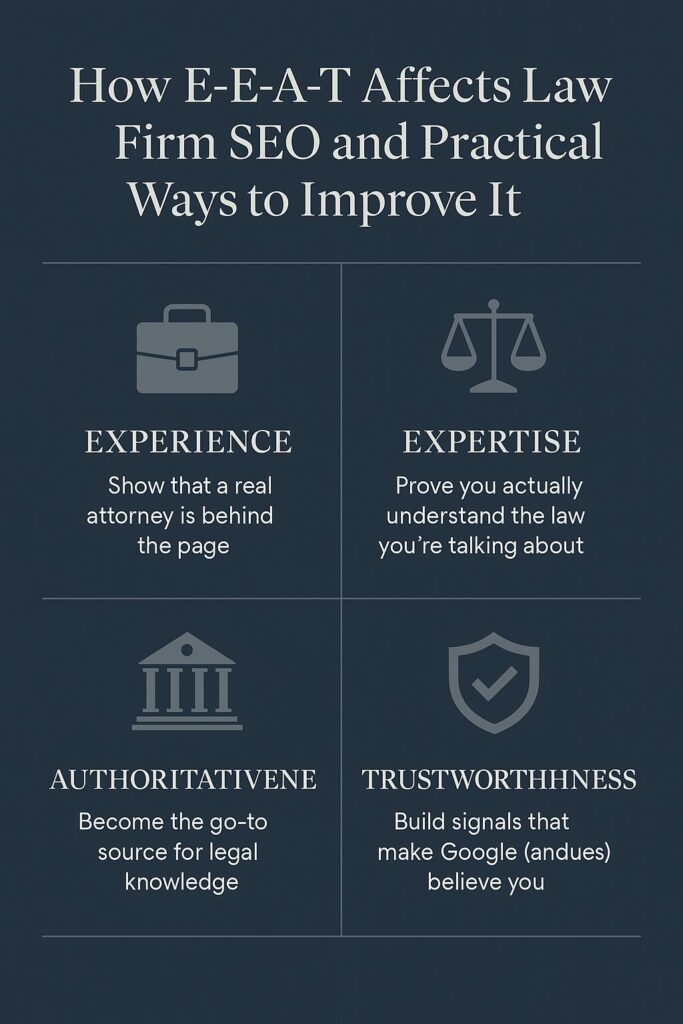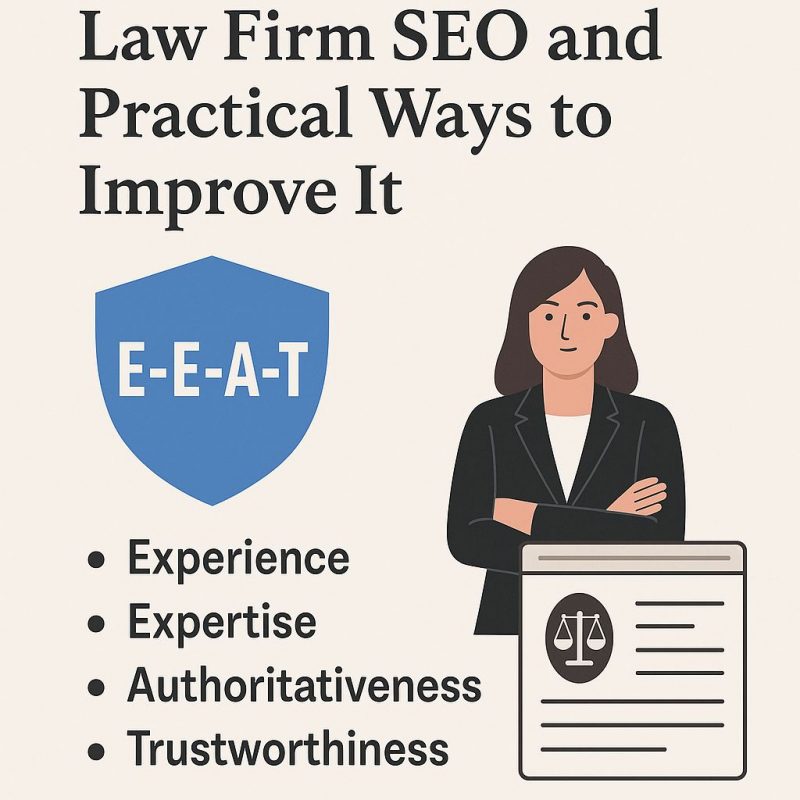If you run a law firm and want to rank in Google, you need more than just content. You need trust. Authority. Proof that you’re qualified to talk about the law. That’s where E-E-A-T comes in.
E-E-A-T stands for Experience, Expertise, Authoritativeness, and Trustworthiness. It’s not a gimmick. It’s how Google evaluates content quality, especially in industries like law, health, or finance.
Legal content falls under what Google calls YMYL: Your Money or Your Life. These are sensitive topics. They impact someone’s financial future, legal standing, or personal well-being. So Google applies stricter rules.
If your website feels generic, or anonymous, or disconnected from real legal expertise, it won’t rank. Period.
This guide breaks down how each part of E-E-A-T works. And more importantly, how you can use it to your advantage. You’ll learn how to show experience on the page. How to write with legal authority. How to signal trust through small but critical changes.
Let’s start with the first E: experience. Real cases. Real voices. Real people behind the screen.
Experience: Show That a Real Attorney Is Behind the Page
Google doesn’t want general advice. It wants real-world knowledge.
That’s why the first “E” in E-E-A-T matters so much. Experience shows that someone who’s been there, someone who’s handled real legal situations, is sharing insight.
So how do you show experience on your site?
Start with authorship. Every legal article or blog post should have a name attached. Not “admin.” Not “team.” An actual licensed attorney. With a link to their full profile.
Then bring that experience into the writing. If you’re talking about car accident cases in Georgia, mention local intersections. Mention insurance company tactics you’ve seen. Reference what clients typically feel in those first 72 hours.
Real experience isn’t abstract. It’s specific.
Case studies help too. Don’t publish results alone. Walk through the situation. Explain what made the case hard, or unique. What steps your team took. How you navigated the local court.
The tone matters as well. A page that sounds like a textbook won’t connect. Speak plainly. Write like you’d explain it to a client across the desk.
When Google sees depth, detail, and a human source, it ranks that page higher. Clients do the same.
Expertise: Prove You Actually Understand the Law You’re Talking About
Expertise is the second key. And for law firms, it should be the easiest to prove, yet most sites still miss the mark.
Google wants to see content written by people who deeply understand the topic. That means going beyond surface-level definitions.
If you’re writing about slip and fall claims, you can’t stop at “property owners must maintain safe premises.” You need to talk about foreseeability. Invitee status. Relevant Georgia statutes.
Break down what “comparative negligence” actually means in practice. Not just the law, but how it’s applied in local courtrooms.
That’s how you prove expertise.
Add citations where appropriate. Reference local civil codes. Link to Georgia Bar resources or court documents. Show that you’re not just copying, you’re contributing.
And again, connect content to the right attorney. A post about nursing home abuse should be tied to someone who’s handled elder neglect litigation.
The attorney’s bio should reflect that expertise: years in the field, relevant certifications, affiliations with legal associations.
Google’s systems are designed to evaluate this at scale. They’ll cross-check your site’s content with credentials, depth, and structure.
Expertise isn’t about showing off. It’s about clarity. And when people understand you, they trust you. That’s what makes them click. That’s what makes them call.

Authoritativeness: Become the Go-To Source for Legal Knowledge
Authority isn’t just about being right. It’s about being recognized.
In SEO terms, Google sees a site as authoritative when others reference it. When trustworthy sources link to it. When users spend time reading it, and come back for more.
For law firms, this means one thing: you need to become the place people go to when they have legal questions.
Authority starts with content. But not just any content. You need in-depth, well-organized, topic-specific pages. Think definitive guides on medical malpractice in Georgia. Or step-by-step breakdowns of what to do after a DUI arrest in Macon.
The deeper and more useful your content is, the more people will cite it. That’s how authority grows.
But don’t stop at blog posts. Speak at legal seminars. Get mentioned in local news stories. Publish client-friendly explainers on third-party sites. These references, especially with backlinks, build domain-level credibility.
Also, build a strong attorney bio for each lawyer. Include bar numbers, law school, speaking engagements, and notable verdicts. These aren’t just trust signals. They are authority signals Google uses in author matching systems.
Finally, keep your site updated. Outdated pages lose authority fast. Refresh your content. Add new insights. Show Google you’re still active, still accurate, and still leading.
Trustworthiness: Build Signals That Make Google (and Users) Believe You
Trust is what makes all the other E-E-A-T elements work. Without it, nothing else matters.
So how do you make your law firm’s site feel trustworthy, to Google and to real users?
Start with the basics. Your name, address, and phone number (NAP) must be consistent across your entire site, and on every legal directory you appear in. That includes Google Business Profile, Avvo, Justia, and Yelp.
Make sure your site has HTTPS. Yes, it’s standard. But Google still considers it a signal. So do users.
Your “About” page should be detailed. Include staff photos. Actual office locations. A real contact email, not just a form.
Each piece of content should list a responsible author. Add last-updated dates. That’s a small detail, but it tells Google that you maintain accuracy.
Also, get reviews. Google Reviews matter more than you think. But don’t aim for quantity alone. Respond to reviews. Engage with people professionally. That back-and-forth shows you’re active and real.
Lastly, avoid anything that looks like manipulation. Don’t use fake testimonials. Don’t overpromise. And never create misleading or spun content. Google is trained to detect it.
If people feel safe, they stay longer. They click deeper. And those actions tell Google: this site can be trusted.
Use Schema Markup to Make Your Experience and Authority Clear
Schema isn’t flashy. But it’s powerful.
It’s a structured way to tell Google what your site is about, without depending solely on visible content.
For law firms, Schema markup can help you show off experience, expertise, and trustworthiness in a language search engines understand.
Start with Organization schema. This should include your firm’s name, location, logo, contact info, and founding date.
Then use Person schema for your attorneys. List bar numbers, practice areas, and links to their bios.
Go deeper with LegalService schema. This is specifically designed for legal websites. It lets you define practice areas like personal injury, criminal defense, or estate planning, and tie them to your geographic region.
Also add Review schema. If you display client testimonials on your site, mark them up properly. This can help trigger star ratings in search results.
Another underrated type: FAQPage. When used right, this can get your answers featured directly in Google’s SERPs. It also signals that your site provides clear, structured help, another trust factor.
Remember: schema won’t boost rankings on its own. But it strengthens your E-E-A-T profile. And when combined with great content and technical health, it pushes your entire domain upward.
Monitor Author-Specific Pages Using Google Search Console
Want to know which attorney on your team is generating traffic? Use Google Search Console.
GSC is more than just a general analytics tool. It lets you dive into the actual search queries that bring users to specific pages. And that means you can evaluate how each author is performing.
First, go to the “Search Results” section. Filter by “Page.” Find any URLs tied to an attorney bio, a blog post with a byline, or a location page featuring a specific lawyer.
Now look at the “Queries” tab. You’ll see exactly what people are typing into Google before landing on that page.
Are they finding the page for the lawyer’s name? The topic they wrote about? Or something off-base? That insight helps you refine both the content and the bio strategy.
If certain attorney pages aren’t ranking, check the basics. Do they have schema? Are they linked from your homepage or practice area pages? Do they mention bar credentials, practice years, and case types clearly?
You can even monitor changes over time. Run comparisons. If you updated a lawyer’s bio in April, did impressions rise in May?
The data is all there. Use it to shape your team’s digital authority. Every lawyer’s online footprint matters, and GSC helps you optimize each one.
Use Video and Podcast Content to Amplify Experience and Authority
Text matters. But Google, and your potential clients, also respond to voice and presence. That’s where video and podcast content come in.
When a real attorney speaks on camera or in a recorded interview, it becomes nearly impossible to fake credibility. You’re showing, not just telling, that you know what you’re doing.
Start simple. Record short videos where your attorneys answer common questions. “Do I have a medical malpractice claim?” “How long do I have to file a lawsuit in Georgia?” Keep the answers direct and client-focused.
Then host them on relevant service pages. A 90-second video on your “Birth Injury” page can significantly improve engagement. And dwell time. And bounce rate.
Podcasts work too. Feature your team. Discuss real case trends (anonymized). Talk about what’s happening in local courts. Explain recent changes in Georgia law. When that voice belongs to a licensed attorney, your E-E-A-T profile strengthens.
Add transcripts. Mark them up with schema. Link from those transcripts back to attorney bios and blog content.
This content isn’t just for rankings. It’s for trust. For connection. For showing clients that your firm isn’t just a name on a screen. It’s people. Professionals. Present.
And in today’s search landscape, that might be your biggest advantage.
🔥Futureproof your firm’s visibility. Talk to our lawyer SEO experts today.
Refresh Outdated Content to Maintain Expertise Over Time
Even great legal content expires. Laws change. Deadlines shift. Court procedures evolve. And Google notices.
That’s why refreshing old content is one of the simplest, most powerful ways to protect your SEO and your expertise.
Start by auditing your site. Sort blog posts and service pages by publish date. Anything older than 18 months should be reviewed.
Check the law. Is that statute still valid? Are those damage caps still accurate? Is your process still the same?
Then look at the structure. Is the post easy to scan? Does it reflect what your users search for today? Are the internal links still relevant?
Don’t just tweak the date. Rewrite where needed. Expand thin paragraphs. Add updated examples. Insert new links to current cases or related blog content.
Once refreshed, resubmit the page in Google Search Console. Use the “Inspect URL” tool and request indexing. That signals freshness to Google, and can trigger faster re-ranking.
Freshness isn’t just an SEO signal. It’s a user trust factor. People searching for legal guidance don’t want to read advice from 2019. They want help now.
When you show them that your content is current, you show them that your firm is active. Aware. And in tune with their case, today.


